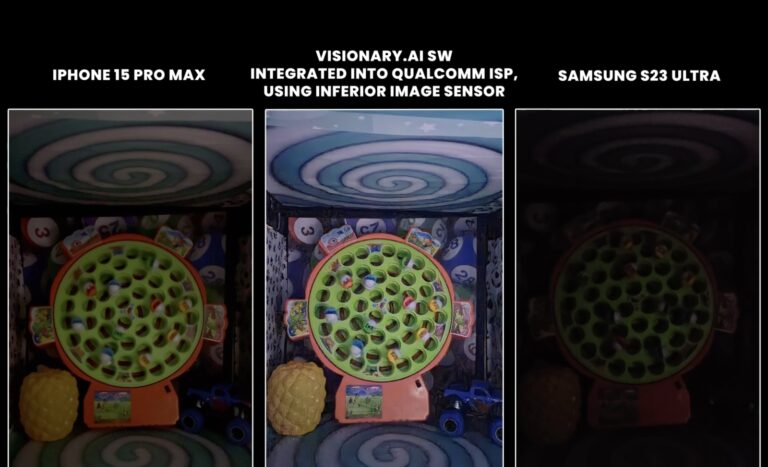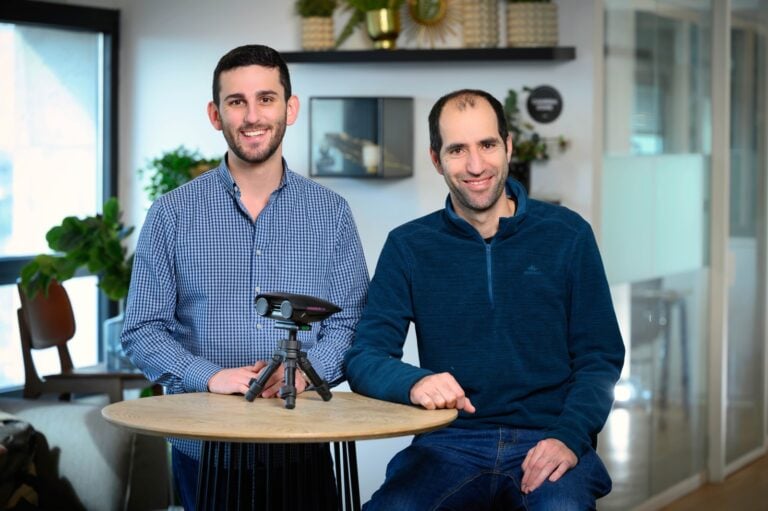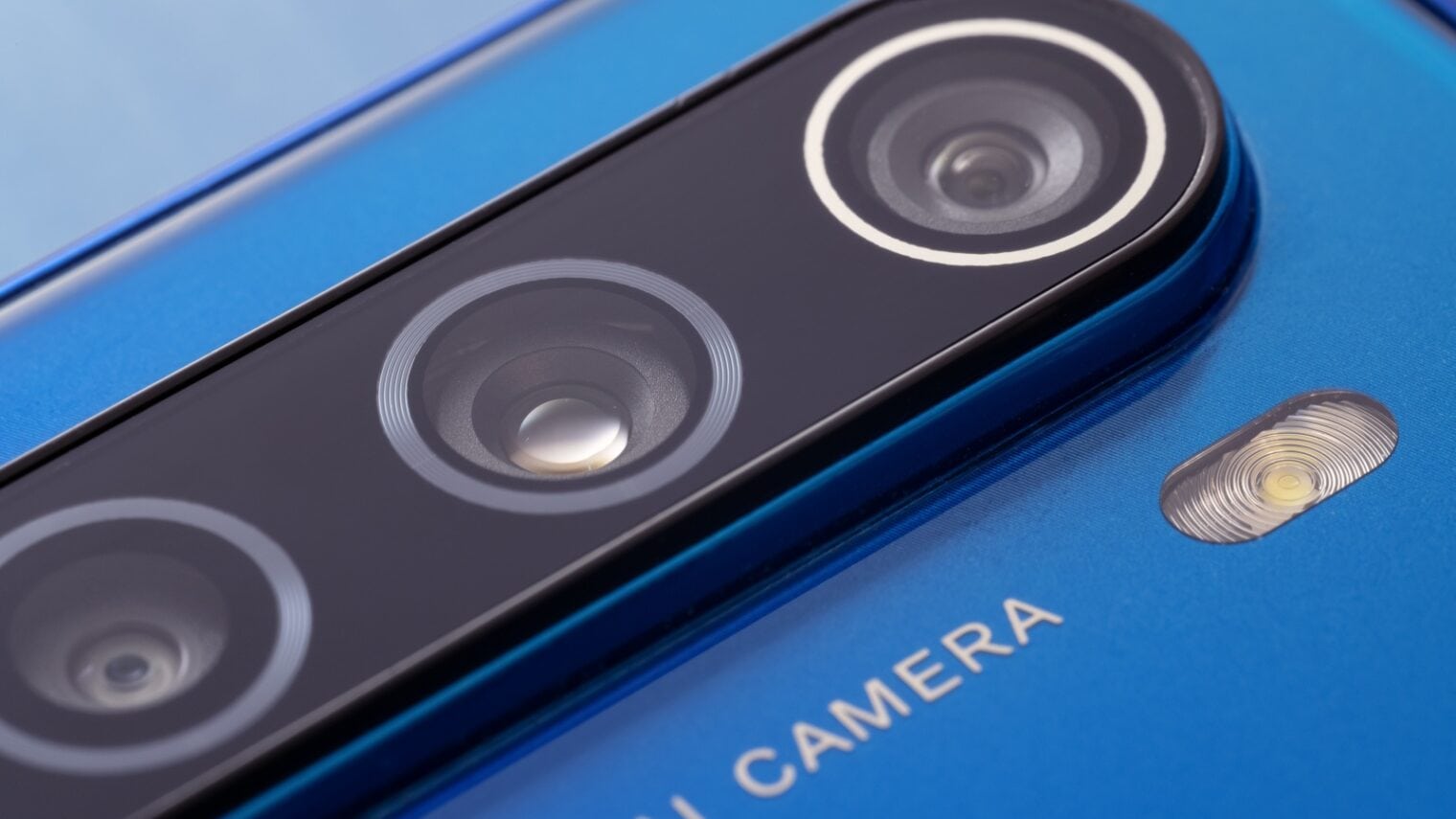You’re standing with your family in front of a dimly-lit beach boardwalk after dark. You want to capture their faces, the sand and the waves in a photo or video, but the sun isn’t cooperating at that hour.
Thanks to a new partnership between Israeli startup Visionary.ai and leading chipmaker Qualcomm, taking stunning visuals in low-light conditions will be possible on the next generation of Android smartphones – perhaps as early as this year – by pairing Qualcomm’s Snapdragon 8 Gen 3 processor with Visionary.ai’s night-vision tech.

Visionary.ai, as the two-letter suffix to its name implies, uses AI (artificial intelligence) to improve the quality of camera sensors and lenses.
The company allowed visitors at its booth at the Consumer Electronics Show (CES) in Las Vegas in January to participate in a “low-light challenge to test out their own cameras’ video quality against cameras powered by Visionary.ai’s software,” the company’s vice president of marketing, Althea Mirvis, tells ISRAEL21c.
It was the first time Visionary.ai had shown the tech running on a consumer application.
Mirvis recalls a senior executive from one of the world’s largest camera manufacturers came over at CES and said, “I thought that Visionary.ai was a small company, but now I see you are everywhere.”
“By chance, he had just visited a few of the companies we are partnered with, and everyone had been talking about us. We laughed together and told him that we are indeed a small company, but that yes, we are everywhere in the ecosystem.”
Timing is everything
In the past, the only way to get better pictures and videos on a consumer electronics device like a smartphone or a digital camera was with hardware – a larger lens or more sensors, which add weight and heat and also drain the battery.
Visionary.ai’s approach is based entirely on software.
Since the company was founded in 2020, the software requirements have shrunk enough that now Visionary.ai’s AI-powered algorithms can fit on a camera as small as the one on the tip of an endoscope, a medical device used for exploring the human gut, indicating that Visionary.ai’s range could someday extend beyond just consumer devices.
Timing is everything.
“If we were developing this a few years ago, there would be nowhere to run this software,” explains Yoav Taieb, CTO, one of the company’s cofounders along with Oren Debbi, Visionary.ai’s CEO.
“It would need a very strong computer with a lot of power. But in the last few years, AI accelerator chips in phones have gotten a lot more powerful and can process a lot more information. We leverage those powerful chips to run our software.”

This is part of an overall trend. “If improving smartphone photography used to involve upgrading the physical sensor and the lens,” Taieb says, “now the focus has shifted to improving the software and the algorithms inside.”
As such, Visionary.ai’s software “lives” either on the camera sensor or, as in the Qualcomm partnership, on a silicon chip adjacent to the sensor.
Debbi compares what Visionary.ai can do for photography and video in software with a car. “Imagine if you could take a cheap car, give it a software upgrade, and then it would be able to outperform a racecar. That’s what we’re doing for cameras.”
In real time
Part of Visionary.ai’s appeal is that all processing is done locally, meaning you’ll get image and video enhancement in real time.
Compare that with the “video boost” feature in Google’s Pixel 8 Pro, which captures raw files from a recording, uploads them to the cloud to process, then downloads an edited version in better quality. It must be manually enabled for every recording and there’s a 10-minute limit.
Such an arrangement for, say, a security camera, “wouldn’t be helpful if it’s not being run in real time,” Debbi tells ISRAEL21c.
Another point of differentiation: When companies like Apple or Google build software for their own devices, they don’t typically license them externally.
“We’re democratizing premium video quality and making it available to a wider market,” Debbi notes.
Restormer, an open-source program for denoising video, requires more computer power and takes 212 times longer to execute than Visionary.ai’s solution. No real-time benefit here either.
Cutting the noise
Visionary.ai’s tech covers a wide range of photography and video needs.
- An AI-based “denoiser” reduces image noise with software, which means lower cost and less wasted energy.
- A software image signal processor (ISP) results in sharper images and more accurate color, also for daytime video and image capture.
- Real-time video enhancement can blur backgrounds or correct where one’s eyes are directed during a video conference call or while taking a selfie.
- For smartphones that use facial recognition to unlock, Visionary.ai can make it much easier for the device to recognize users even in a pitch-black room.
How does Visionary.ai work its magic? Debbi didn’t want to share too much of the company’s secret sauce, but CTO Taieb told the website PetaPixel that its AI-based approach applies a sophisticated algorithm to the raw image data to separate the noise from the image signal.
The video below demonstrates just how powerful software-based visual enhancement can be. It compares Visionary.ai’s tech with the Samsung S23 Ultra and the iPhone 15 Pro Max. The video was taken at 0.2 lux, comparable to moonlight in the desert with no light pollution.
A pandemic idea
Debbi and Taieb got the idea for Visionary.ai during Covid lockdowns as Zoom became the primary way to communicate during the early days of the pandemic.
“Covid really highlighted the problem,” Debbi tells ISRAEL21c. “We suddenly found ourselves spending hours each day on Zoom calls in front of dark and blurry screens with poor video quality. We wondered if we could improve the video quality by improving the software. We found that low-light was a huge problem – not just for Zoom but in so many other use cases.”
Debbi, 29, has a young child, so boosting the image quality appearing in his kids’ baby monitors was also an inspiration.
The company has raised around $10 million since its founding. In 2023, CB Insights selected Visionary.ai out of some 9,000 companies as one of the 100 most promising private AI companies in the world.
When ISRAEL21c first started tracking Visionary.ai several years ago, after the company’s first appearance at CES, Debbi and the team listed several potential target markets: video conferencing, CCTV (closed-circuit), drones, medical applications, automotive (inside the vehicle to monitor driver alertness, outside to prevent accidents in low light), and smart cities.
But the buzz at CES was all about phones and consumer devices, so that’s where Visionary.ai’s Jerusalem-based team of 15 is focusing now. The model is business-to-business with device and chipmakers – although Debbi did not rule out future direct sales to individuals as an upgrade or add-on.
“For now, we want to continue growing and to get our technology into every camera in the world,” Debbi stresses.
Running a company during a war
We caught up with Debbi on a rare moment of relative calm.
Since the October 7 Hamas attack, he has been serving in the IDF reserves. He was able to get out to attend CES. Then he was back in, rescuing injured soldiers in Gaza.
While he’s been away, Taieb has been working double-time in the office “to keep things running smoothly,” Mirvis tells ISRAEL21c. Despite the war, “we had our best quarter of the year. At CES, we had lines out the door.”
Did Debbi, Taieb and Mirvis encounter any anti-Israel sentiment on the showroom floor?
“None at all,” Debbi says. “People said Israel has the most amazing technology.”
“We see the same resilience in the high-tech sector as we do on the battlefield,” he says.
“People are working more together now, they’re more connected, everyone wants to help. Throughout our history, Israel has always jumped back stronger than before. The people of Israel are optimistic. We won’t let tragedy stop us or get in the way of innovation. We want to build a better future for our children.”
One in which the kiddos’ night-time antics are captured in beautiful, enhanced and unnoisy video.
For more information, click here.

















